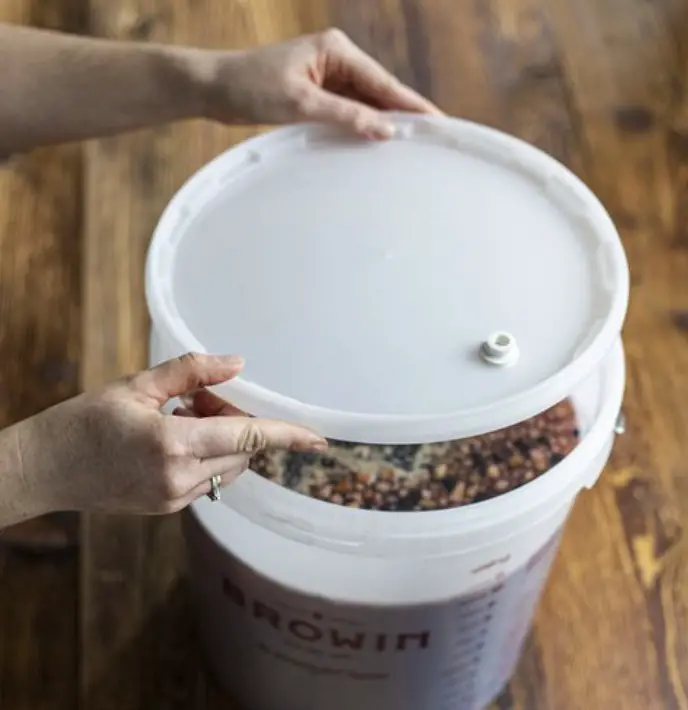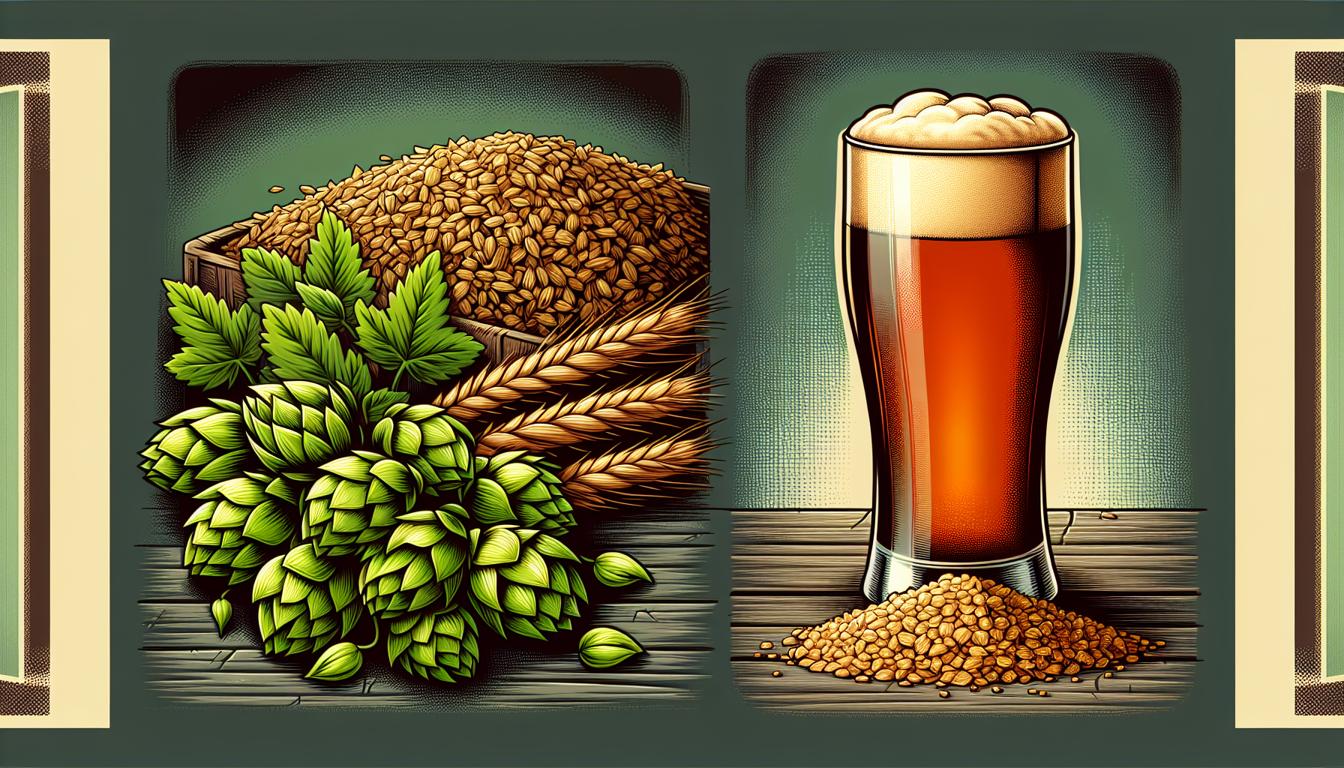Fermented cider, hard cider, or just “cider”, is a spectacular drink made from the juice of apples or pears that have been processed by microorganisms in a container without oxygen.
This process of cider fermentation involves the breakdown of nutrients in the juice, which leads to the release of somewhat smelly chemicals. These aromatic compounds include the phenols and alcohols that give apples their favorable smells, but also sulfur, ammonia and volatile acid compounds that smell like rotten eggs, fish or sweat!
Cider brewing is the process of turning apple juice into alcoholic cider. The chemical process involves fermenting the sugar in the apple juice into ethanol, but many other aromatic compounds are released or formed in the process.
Yeast is used to catalyze this fermentation process, and the end result is a cider with an alcohol content of 5-8%.
However, before the brew is finalized, the yeast will eat and convert thousands of compounds in the juice into new chemicals that gives the brew its smell!
Why does brewing smell?
No matter if you are brewing, wine, beer or cider, yeast fermentation is involved.
During this process the yeast has to eat more than just sugar, and it will therefore ingest and metabolize proteins found in the juice.
Depending on the proteins, they contain varying amounts of different chemical groups that will be released into the brew.
Some of these compounds are what makes your bubbling brew smell!
The most important aromatic compounds when it comes to brewing are:
- Esters (they all smell of flowers and ripe fruits)
- Phenols (some smell like vanilla, but many cheesy and musky)
- Pyrazines (the smell of grass, chocolate and vegetables)
- Terpenes (smells of pine wood, spices and lavender)
- Thiols (most smell bad like skunk or fish)
- Organinc acids (sour smells like yoghurt or sweat)
So, if any bad smells are coming from your cider, or any other brew, it is likely to be caused by the thiols (sulfur compounds), phenols or acids present in the brew.
However, as you can see in the table below, there are many different chemical families that contribute to the aroma of a brew – be it cider, wine, beer or champagne!
| Aromatic group | Good smells | Bad smells |
| Esters | flowers and ripe fruits | Artificial, too sweet |
| Phenols | Vanilla, wood, sweet, smoke | Cheese, tar, plastics |
| Pyrazines | grass, chocolate, vegetables | Mushy, green pepper, mud |
| Terpenes | pine wood, spices, lavender | Gas, turpentine |
| Thiols | Dark chocolate, burned | Skunk, onion, smoke |
| Aldehydes | Nuts, fruits, grains, grass | Musty, burned, gas |
| Ketones | Flowers, fruits, cheese | Cheese, nail polish, Acetone |
| Amines | Nope. | urine, dead animals, fish |
| Carboxylic acids | wax, nutmeg, vinegar | Rancid, sweat, sour feet |
These are not single chemicals, but families of many different versions of chemicals. For example, the esters are responsible for major smells in almost all flowers and fruits!
All of these chemical families have molecules in them with different structures that can make them smell both good and bad. And some of these smells are subjective to the individual person smelling them of course!

For example, some people might love the sweet smell of gas or cheese coming from the terpenes or carboxylic acids that some ciders have, whereas other individuals are repulsed.
Why does my cider smell like rotten eggs?
All rotten egg smells in brewing come from the sulfur compounds being present or formed in the brewing process.
Sulfiting cider is a common winemaking technique which can be used to protect cider from oxidization, inhibit the growth of bacteria, and adding a slight level of sulfites can also help prevent the cider from losing its color.
However, the smell of rotten eggs, may come regardless of the addition of sulfur (campden tables, for instance), as it is formed naturally from the amino acid metabolism of the yeast.
The thing with sulfur compounds is that very little is needed for them to smell. Very low levels of hydrogen sulfide (H2S), for example, can be smelled like an egg or farty smell throughout even larger rooms.

Usually such smells are present during the active fermentation, and later evaporate off never to return. So do not fear for your final product yet!
If the smell persists beyond fermentation, there is likely still hydrogen sulfide or similar sulfide compounds dissolved in the brew.
You can test to see if there are any sulfides left in you brew by taking a small amount of the cider and distributing it into two glasses.
In one glass you will reduce (in all senses of the word!) the sulfide compounds by adding a copper coin (or similar copper item) to it!
If the sulfur smell disappears in the glass with the added copper, there is a high likelihood that the problem is caused by sulfides.
How to remove the rotten egg smell from cider?
Most likely the smell will subside by itself after the primary fermentation is done. This can take everything from weeks to months depending on the conditions and yeast used and wether yeast nutrients are added or not.
If time does not solve the problem, hydrogen sulfide and some related compounds can sometimes be aerated out of the brew. This can be done, for example, by racking the cider in a splashing manner.

Another solution, as exploited in the test for the presence of hydrogen sulfide above, is the addition of cobber to remove sulfides via reduction to a copper salt that is not volatile and therefore does not smell or taste much.
The copper is often added in the form of copper sulfate and will then form small amounds of sulfuric acid as a result:
H2S + CuSO4 -> CuS + H2SO4
Be aware though that very little cobber is needed (maximum 0.5 ppm) otherwise it can ruin the cider and your health!
One might also use solid copper metal for the purpose as outlined in the video shown here:
The removal of hydrogen sulfide has to be done early on otherwise it will react with molecules present in the brew and become less volatile mercaptans that eventually become disulfides that are very hard to remove!
Trying to remove sulfide smells later on also comes at the risk of losing other flavors as well and oxidizing the alcohol present.
Why does my cider smell like basement or horse stables?
Some people talk about ciders smelling like horses, basement or stables, which is a mix of the musty aldehyde odors and amines or sulfur compounds. Some are smelled and others are mostly tasted.
These are quite common natural smells and tastes that often arise when ciders are “wild fermented” using the natural yeasts present on the apples or pears that are used directly without pasteurization or addition of campden tablets.
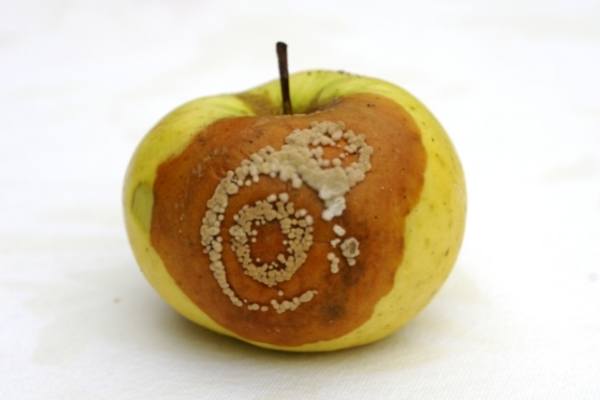
If the smell becomes too strong or musty basement-like they likely come from acetyl pyrrolines and tetrahydropyridines.
These compounds are only slowly released from the cider as drunk, and interestingly, the extent to which different people taste and smell them depends on the chemical environment and pH or their saliva!
One way to test you cider for these compounds is to take a small sample and make it alkaline. For example, you might want to add baking soda to a small glass and then smell it.
If the smell is enhanced, then it likely stems from yeast metabolism of lysine by (wild) yeasts that are most common in those yeasts of the Brettanomyces genus!
There are no good ways of removing these odors and tastes unfortunately, but ensuring a clean and anaerobic (oxygen free) environment at all times will reduce the change of Brettanomyces growth.
These compounds or the presence of Brettanomyces is not dangerous, but will only impact taste and smell. So if the impact is small, I would not worry too much.
However, these same odor characteristics may also come from the contamination with mold and in that case drinking the cider will be somewhat unhealthy due to the chances of toxins and fungal spores being present!
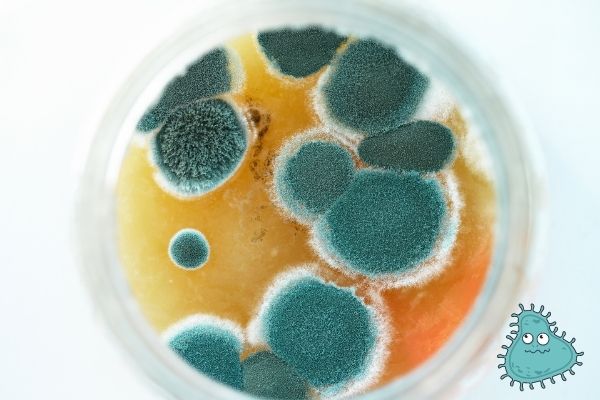
However these mold (filamentous fungi) are easy to detect as they require oxygen to grow and will therefore only grow on the surface of your brew.
Why does my cider smell like pee?
The smell of pea most likely stems from a mix of the acids, sulfides and amides formed in the brewing process.
These smells may arise as a result of amino acid metabolism and contamination of oxygen. They are more likely to arise with wild yeasts and at higher temperatures, so make sure to keep the cider cold, clean and oxygen free!
How to get rid of pee smell in cider
Whereas these smells are not dangerous per se, and they will likely go away with time. Try to bottle the brew and let it sit for a few months and they will often improve.
If you want to speed up the odor removal you might want to try and aerate the cider by racking, or even better N2 aeration, which will reduce most smelly volatile compounds.
The efficiency of degassing does, however, depend on the pH and temperature of the brew.
Why does my cider smell like vomit?
When homebrew smells (and tastes!) like vomit it is usually caused by carboxylic acids such as butyric acid.
These compounds are usually formed by oxygenation of alcohols or the presence of (lactic acid) bacteria that make these short chained fatty acids in your brew.

As they are volatile, they may evaporate with time, but they may also stick around in the final procut!
Contrary to sulfur (rotten egg) and ammonia (urine) smells, these are not usually solved by aeration of the brew as this might just further exacerbate the problem by oxidizing alcohols into acids.
However, these smells may also be caused by certain bacterial of the Clostridium genus such as Clostridium buturicum, which are not dangerous, but also not nice to have in a brew.
These bacteria die upon exposure to oxygen, so here a good aeration early on is actually essential to avoid the contamination.
How to avoid smelly cider
In the previous sections I have already given some advice on how to avoid smelly ciders, but I am going to sum it up more generally.
The best ways to fix bad smells from a brew is simply to avoid it in the first place. The precautions taken to avoid bad smelling cider are the same as advices to avoid spoiling of any brewing process:
- Avoid contamination (use sulfur or pasteurize if necessary)
- Keep the brew oxygen free after initiated fermentation.
- Use the right yeast and provide enough nutrients.
- Keep the brew cold and dark.*
*this depends on the exact purpose and yeast used.
Avoid contamination
This one is fairly obvious. If any outside yeast or bacteria enters the brew, like the Brettanomyces or Clostridia I mentioned above, there is a chance that they will cause bad odors or misstates.
Keep the brew oxygen free
Oxygen can be a good thing in the beginning of the fermentation, but will do more harm than good by the end of the process.
Oxygen will react with compounds, including alcohol, in the brew and encourage unwanted growth of bacteria and yeasts that are not beneficial to the taste and smell of the brew.
Use the right yeast and add enough nutrients
The yeast strain used for brewing does have a large influence on the outcome. Some yeasts used in cider production are optimized towards the production of aromatic esters to make the brew more fruity, but wild yeasts like Brettanomyces may produce unwanted off flavors.
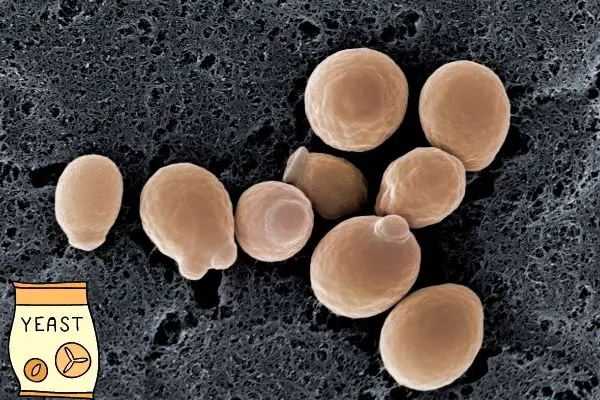
Different yeasts also produce different amounts of H2S through their metabolism, so it is worth finding a yeast with a low H2S production (although these also often are more sensitive to it!).
Another way to avoid smells, and off flavors in your brew, is to add yeast nutrients, especially if the brew is a bit “thin” (low nutrient apples are used) and has low sugar content.
This encourages the yeast to use nutrients more directly from the added supplement, rather than trying to partially metabolize already present amino acids etc., which ends up resulting in metabolic waste products such as the sulfites or amides that smell!
Keep the brew cold and dark
Just like avoiding oxygen will keep your terminal brew more stable, so will low temperatures and darkness.
Like oxygen, light and heat catalyzes and speeds up chemical reactions in the brew that may lead to off flavors. And heat may change the way the yeast metabolize your juice into different compounds.

However, sometimes one may wish to speed up the conversion of aromatic compounds or simply speed up the fermentation and then a warmer temperature can be beneficial.
Colder and darker conditions, however, are known to produce richer more aromatic ciders.
What should fermenting cider smell like?
When the juice starts to ferment it does not keep its nice fresh and fruity smell forever. It changes into something resembling rotting fruits, which is not surprising as we a basically carrying out a controlled rotting process!
While the cider is fermenting, it is not uncommon for it to smell a bit like eggs or sulfur and yeast.
Depending on the temperature, compounds present in the brew will evaporate and after a few weeks the sulfur smells will be replaced by fruitier or sour.
What should finished cider smell like?
By the end of the fermentation, the yeast smell will subside and a cleaner apple aroma will arise.
Depending on the apple or pear blend used to make the cider, numerous different aromas have been detected in the final product and people describe the smell as anything from horse stables to fruit orchards on a late summer morning.
Some ciders I have produced will smell almost like champagne or wine, whereas others have a clear apple smell arising from the glass.

Cider that have been stored on oak barrels, like port wine, will have a noticeable woody and vanilla aroma – almost like whiskey!
A cider is not static though, and the smell will change over time!
This aroma will only be enhanced by storage on the bottle and tends to maximize after a year or two of storage, where the fruity flavors are often at their strongest and many off smells and tastes will subside.
Conclusion
To round up, ciders and all other brews for that matter, may be hit by different off flavors and unwanted smells.
These smells often arise from the fermentation process itself, depending heavily on the yeast used, but may also be inherent to the types of apples used, their pH and nutrient contents.
Finally, contamination is a big source of bad smells in cider and especially wild fermented unpasteurized juice with no sulfur added will be at risk.
But also remember, that sometimes one person’s off-flavors are another person’s favorite characteristic!


